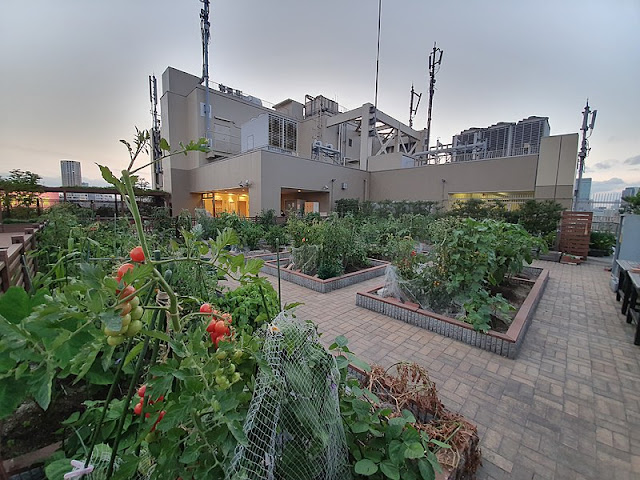 |
| Image credit: Syced/ Wikimedia Commons |
According to citizen science research conducted by the University of Sussex, urban farmers in the UK were able to gather one kilogram of insect-pollinated fruits and vegetables per square metre which also falls within the range of conventional farming.
Urban farming may contribute to local food security, but it is not scalable due to its labor-intensive nature. It is, nevertheless, more sustainable, productive, and environmentally friendly when compared to traditional agriculture. According to some estimates, urban vegetables might offer up to 20% of the world’s food. Over the years, urban farming has received very little attention and research compared to conventional farming and its methods.
Dr. Beth Nicholls, a UK Research and Innovation Future Leaders Fellow at the University of Sussex presented the initial results at Ecology Across Borders on Wednesday 15th December at Liverpool in the U.K. Ecology Across Borders is a program conducted by the British Ecological Society which is said to be the oldest ecological society in the world. The organization comprises nearly 6000 members from around the world and mainly focuses on advancing ecological science.
In comparison to conventional farming approaches, the urban farmers were able to harvest an average of 70kg per season and it was achieved with the minimal use of pesticides. Eventually, these results are beneficial to biodiversity through habitat creation and low environmental impact.
Over the course of two years, the volunteers observed over 2000 pollinating insects that visited the crops. Bees were the most prevalent pollinators, accounting for 43 percent of all flower visits. Flies, surprisingly, were also frequent visitors, accounting for about 34 percent of the total insect visits.
Beth Nicholls also stated that in a world of increasing urbanisation of both developing and developed worlds, the production of food in and around cities has got great potential. It could help to improve nutritional and health outcomes, reduce poverty and provide habitat for wildlife and create sustainable cities simultaneously.
Urban farmers using fewer pesticides in comparison to conventional farming was a key highlight. The reduced use of pesticides was a boon to the insects and wildlife that feed on these plants.
Nicholls further mentioned that “The UK imports approximately £8 billion of fruit and vegetables each year, but our results show that green spaces in cities, such as allotments and community gardens, could play an important role in meeting that demand at a local scale.”
The findings show that urban growing offers local produce with limited usage of pesticides and also contributes towards the betterment of biodiversity which in turn is a win-win situation for the environment. This is a huge benefit to nature and its inhabitants in the long run.
This study and the methods used in it provide a different approach and valuable insights into urban farming which could be adapted for various developing and developed countries with little effort.
A similar study is currently being conducted in Calcutta, India. Beth elaborated: “We are currently collaborating with researchers from the Centre for Pollination Studies at the University of Calcutta, who are exploring the viability of urban food production in India, a developing country where urban food production happens on a larger scale and food is produced both for personal consumption and for sale at markets.”
Contributed by: Mithun Sukesan
To ‘science-up’ your social media feed, follow us on Facebook, Twitter or Instagram!

